Contents
- What are Local Business Listings?
- Benefits of Local Business Listing Sites
- i. Increased visibility
- ii. Search engine optimization (SEO)
- iii. Targeted marketing
- iv. Access to local customers
- v. Credibility and trust
- vi. Contact information accessibility
- vii. Customer reviews and ratings
- viii. Mobile accessibility
- ix. Cost-effective marketing
- x. Competitive advantage
- xi. Social proof
- xii. Analytics and insights
- Best Local Business Listing Sites- Our Top 10 Picks
- How to List Your Business in Local Business Listing Sites?
- Step-1. Compile business information
- Step-2. Create a business email address
- Step-3. Claim and optimize your Google My Business (GMB) listing
- Step-4. Explore other major local business directories
- Step-5. Research niche-specific directories
- Step-6. Create consistent business citations
- Step-7. Utilize industry-specific platforms
- Step-8. Local chamber of commerce
- Step-9. Social media profiles
- Step-10. Monitor and update listings
- Step-11. Encourage customer reviews
- Step-12. Consider paid listings
- How to Choose The Best Free Local Business Listing Sites
- i. Relevance to Your Business Niche
- ii. Local search engine rankings
- iii. User-friendly interface
- iv. Customer reviews and ratings
- v. Geographic reach
- vi. Website authority
- vi. Customization and additional features
- vii. Mobile compatibility
- viii. Consistency across platforms
- ix. Social media integration
- x. Analytics and insights
- xi. Adherence to guidelines
- xii. Regular updates and maintenance
- xiii. Costs and free features
- xiv. Competitor analysis
- Final Thoughts
Top 7+ Local Business Listing Sites for 2025
For local businesses, navigating the online jungle can feel like stumbling through a maze blindfolded. Customers are out there, searching for your services, but how do you make sure they find you amidst the digital wilderness? The answer lies in local business listing sites, your secret weapons for conquering online visibility and attracting a steady stream of customers.
However, the fact is that all local business listing sites aren’t equal to bring the same result. In the ocean of listing submission sites, it’s quite difficult to choose the right one especially when you are new to the field. With that keeping in mind, we have cherry-picked a list of local business listing sites that will help you conquer online visibility and get a swarm of customers.
So, without further ado, let’s dig deeper.
What are Local Business Listings?
Local business listings refer to online directories or databases that contain information about businesses within a specific geographic area. These listings provide details such as the business name, address, phone number, website, operating hours, and sometimes additional information like reviews and ratings. The purpose of local business listings is to make it easier for people in a particular location to find and contact businesses within their community.
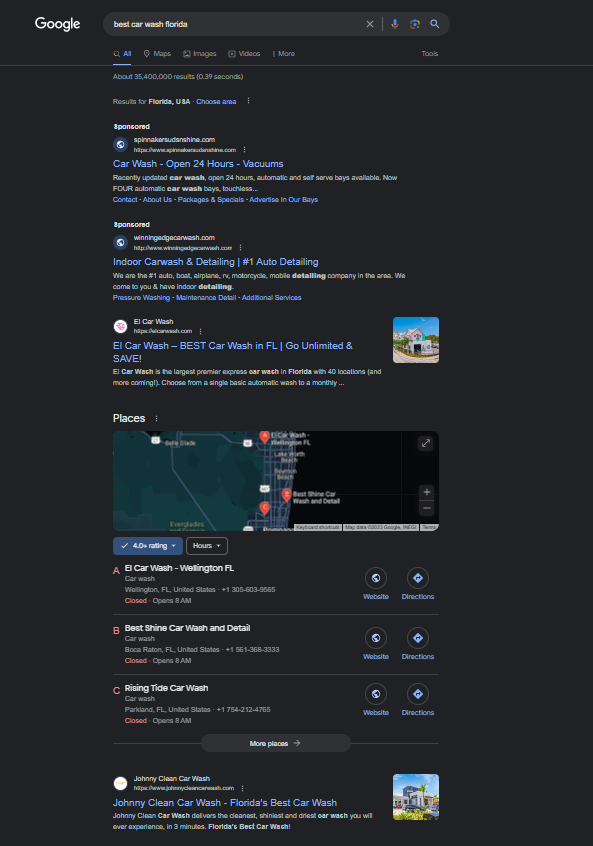
Benefits of Local Business Listing Sites
Local business listing sites offer several benefits for businesses looking to establish an online presence and connect with local customers. Here are some key advantages:
i. Increased visibility
Local business listings increase your online visibility, making it easier for potential customers to find your business when searching for relevant products or services in a specific location.
ii. Search engine optimization (SEO)
Many local business directories have high domain authority. By having your business listed on these sites, you can improve your website’s search engine rankings, making it more likely to appear in local search results.
iii. Targeted marketing
Local business listings help you target a specific geographic area, reaching potential customers in your vicinity. This is crucial for businesses that rely on local customers, such as restaurants, retail stores, and service providers.
iv. Access to local customers
Consumers often use local directories to find businesses near them. Having an accurate and up-to-date business listing ensures that you can be easily found by local customers who are actively looking for your products or services.
v. Credibility and trust
Being listed on reputable local business directories adds credibility to your business. Consumers often trust businesses that have a presence on well-known platforms, and positive reviews can further enhance your reputation.
vi. Contact information accessibility
Local business listings typically include important contact information such as your business name, address, phone number, and website. This makes it easy for potential customers to get in touch with you.
vii. Customer reviews and ratings
Many local business listing sites allow customers to leave reviews and ratings. Positive reviews can attract more customers, while negative reviews provide valuable feedback that you can use to improve your products or services.
viii. Mobile accessibility
With the increasing use of mobile devices, local business directories are often accessed on smartphones. Being listed ensures that potential customers can find your business while on the go.
ix. Cost-effective marketing
Many local business listing sites offer free basic listings. Even premium listings on some platforms are relatively inexpensive compared to other forms of advertising, making them a cost-effective way to promote your business.
x. Competitive advantage
If your competitors are listed on local business directories and you are not, you may lose potential customers to them. Having an active presence on these platforms helps you stay competitive in your local market.
xi. Social proof
Positive reviews and testimonials on local business listings serve as social proof. They can influence potential customers’ decisions and encourage them to choose your business over others.
xii. Analytics and insights
Some local business directories provide analytics and insights, allowing you to track the performance of your listing. This data can help you understand customer behavior and make informed decisions to improve your marketing strategy.
Best Local Business Listing Sites- Our Top 10 Picks
The best local business listing sites can vary depending on your location and industry. However, here are some popular and widely used business listing sites that can help increase your online visibility and attract local customers.
1 . Google My Business
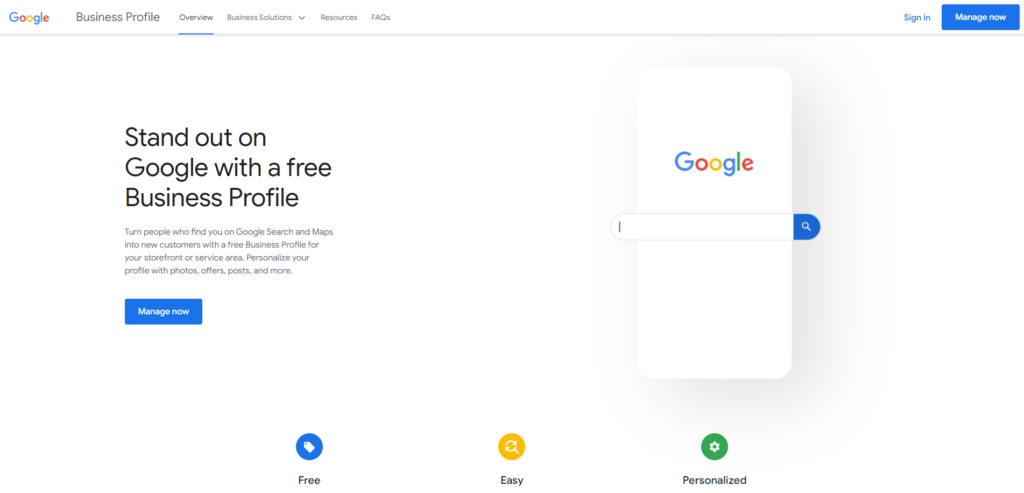
Google My Business is a powerful tool provided by Google that allows businesses to manage their online presence across various Google services, including Google Search and Google Maps. By claiming and optimizing your business listing, you can provide essential information such as your business hours, location, contact details, and even post updates or special offers. This tool is crucial for local SEO (Search Engine Optimization) as it helps your business appear prominently in local search results.
2. Facebook Business
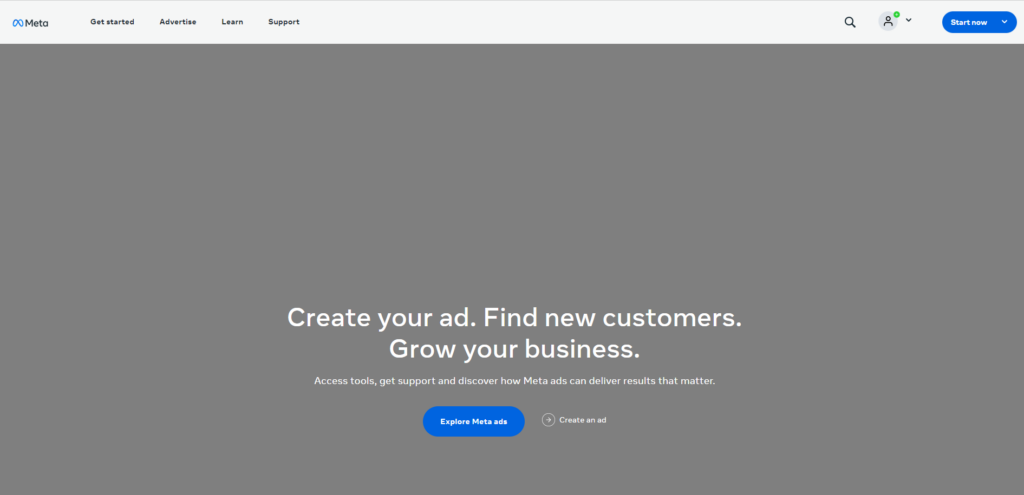
Facebook Business provides a platform for businesses to create a dedicated page on the social media giant. This page serves as a hub for customers to learn about your business, leave reviews, and engage with your content. Businesses can post updates, share photos, and even set up an online store. With Facebook’s extensive user base, a well-managed business page can significantly enhance your online presence and customer engagement.
3. Yelp

Yelp is a widely-used platform for customer reviews and recommendations. Businesses can claim their free Yelp listing to provide detailed information about their products or services. Yelp enables customers to leave reviews, helping businesses build their reputation. Engaging with customer feedback is crucial on Yelp, as positive reviews can attract more customers while addressing negative reviews demonstrates a commitment to customer satisfaction.
4. Bing Places for Business
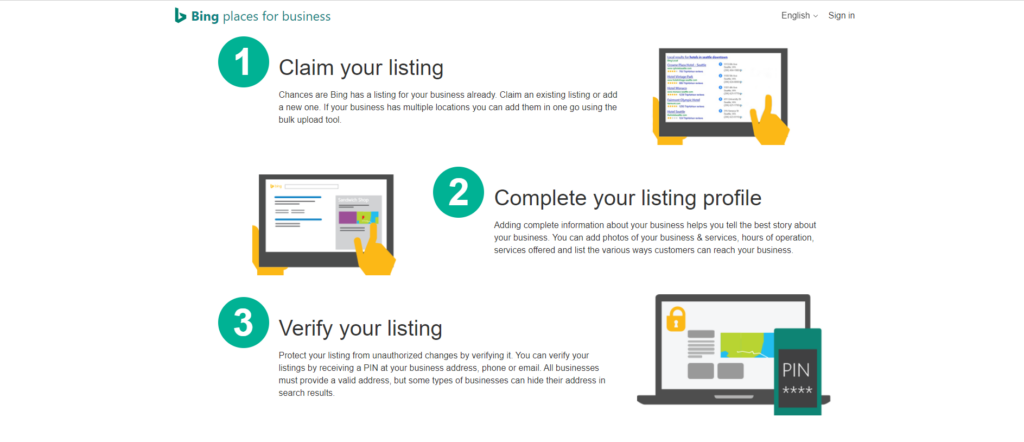
Similar to Google My Business, Bing Places allows businesses to create a free local listing on Bing. By creating a free business listing, you can ensure that your business appears in Bing’s search results and maps. This is particularly important for reaching users who use Bing as their preferred search engine. Like Google My Business, it allows you to share key business details and engage with customers.
5. Yahoo Local
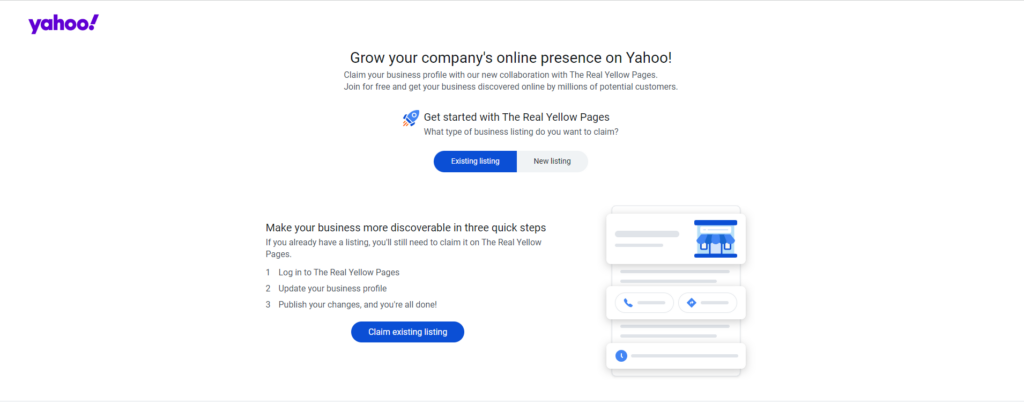
Yahoo Local offers businesses the opportunity to create a free listing that appears on Yahoo’s search results and maps. While Yahoo may not have the dominance it once had, it still attracts a significant user base. A Yahoo Local listing helps ensure that your business is visible to a broad audience, especially those who use Yahoo’s services.
6. Yellowpages
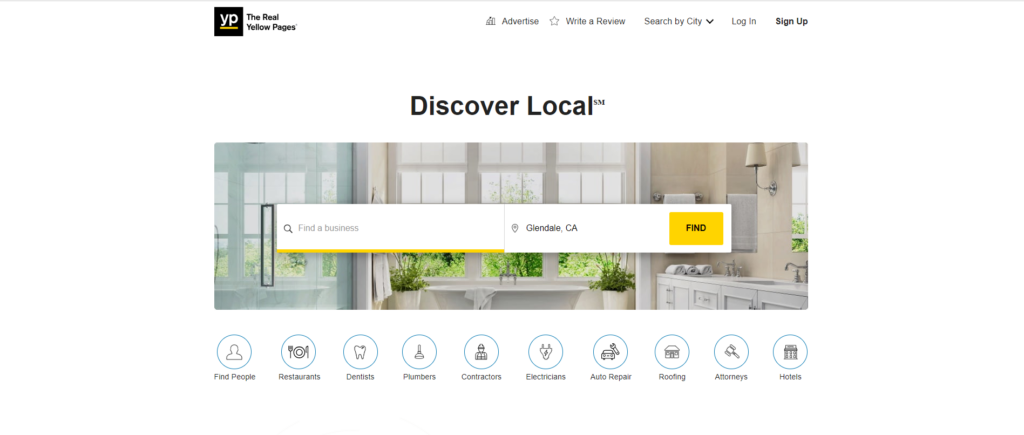
Yellowpages is an online directory that has transitioned from traditional print directories to a digital platform. Businesses can create a free listing, providing essential information such as their contact details, services offered, and hours of operation. Having a presence on Yellowpages is valuable for local businesses aiming to be found by customers searching for products or services.
7. Angie’s List

Angie’s List is a platform focused on connecting consumers with service providers. It specializes in reviews and recommendations for local businesses, particularly in service industries. By claiming your business on Angie’s List, you can manage your profile, respond to customer reviews, and showcase your expertise in your field.
8. Foursquare
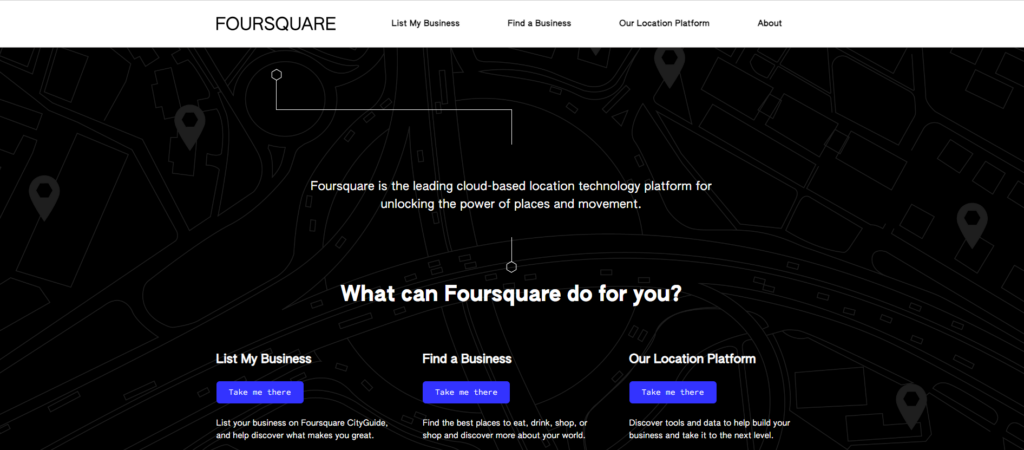
Foursquare is a location-based social platform that allows users to discover and share information about businesses and attractions. Businesses can claim their listing on Foursquare to provide details about their services, location, and operating hours. It’s a platform that emphasizes the importance of physical location, making it particularly relevant for local businesses.
9. Manta

Manta is an online platform designed to help small businesses connect with customers. Businesses can create a free listing on Manta, providing information about their services, contact details, and other relevant details. Manta also offers resources and articles to help businesses grow and succeed, making it a valuable tool for small business owners.
How to List Your Business in Local Business Listing Sites?
Listing your business on local business listing sites is a crucial step for improving your online visibility and reaching potential customers in your area. Here’s a general guide on how to list your business on local business listing sites.
Step-1. Compile business information
Gather all relevant information about your business, including the business name, address, phone number, website URL, hours of operation, and a brief business description.
Step-2. Create a business email address
Consider creating a dedicated email address for business listings. This helps in managing communications related to your business without cluttering your inbox.
Step-3. Claim and optimize your Google My Business (GMB) listing
Start with Google My Business, as it is one of the most important local business listings. Visit the GMB website, claim your business, and provide accurate and up-to-date information. Add photos, choose relevant categories, and encourage customer reviews.
Step-4. Explore other major local business directories
Identify other prominent local business directories such as Yelp, Bing Places for Business, Apple Maps, and Facebook Business. Claim and optimize your business listings on these platforms by providing complete and accurate information.
Step-5. Research niche-specific directories
Depending on your industry, there may be niche-specific directories that cater to your target audience. Research and identify these directories, and submit your business information accordingly.
Step-6. Create consistent business citations
Ensure consistency in the information you provide across all listings. The business name, address, and phone number (NAP) should be uniform. Inconsistencies can affect your local SEO.
Step-7. Utilize industry-specific platforms
Some industries have specialized directories or platforms. For example, restaurants may benefit from being listed on platforms like TripAdvisor or Zomato. Identify relevant platforms for your business.
Step-8. Local chamber of commerce
Check if your local chamber of commerce has an online business directory. Joining the chamber and listing your business can help with local networking and credibility.
Step-9. Social media profiles
Ensure that your business has a presence on major social media platforms like Facebook, Twitter, and Instagram. Complete your profiles with accurate information and engage with your audience.
Step-10. Monitor and update listings
Regularly monitor your business listings for accuracy. Update information promptly, especially if there are changes in business hours, location, or contact details.
Step-11. Encourage customer reviews
Positive reviews can enhance your business’s reputation. Encourage satisfied customers to leave reviews on your business listings. Responding to reviews, whether positive or negative, shows engagement and customer focus.
Step-12. Consider paid listings
Some platforms offer enhanced features or premium listings for a fee. Evaluate the benefits of paid options on relevant platforms to determine if they align with your marketing strategy.
How to Choose The Best Free Local Business Listing Sites
Choosing the best free local business listing sites is crucial for increasing online visibility, attracting local customers, and improving your search engine rankings. Here are some steps to help you identify and select the best platforms:
i. Relevance to Your Business Niche
Choose listing sites that are relevant to your business. If there are industry-specific directories or platforms, prioritize those.
ii. Local search engine rankings
Look for local business listing sites that have high search engine rankings. A platform that appears on the first page of search results is likely to attract more attention.
iii. User-friendly interface
Opt for platforms that have a user-friendly interface, making it easy for potential customers to find and engage with your business information.
iv. Customer reviews and ratings
Check customer reviews and ratings for the listing sites. Positive reviews indicate that the platform is trusted and visited by users.
v. Geographic reach
Consider the geographic reach of the listing site. Choose platforms that have a significant presence in your target location or locations.
Check the domain authority of the listing sites. Higher domain authority can positively impact your business’s online presence and search engine rankings.
vi. Customization and additional features
Some listing sites allow you to add more details, photos, and special offers. Choose platforms that provide customization options to make your business stand out.
vii. Mobile compatibility
Ensure that the listing sites are mobile-friendly, as a significant number of users access information through mobile devices.
viii. Consistency across platforms
Maintain consistency in your business information across different listing sites. This includes your business name, address, phone number, and website.
ix. Social media integration
Platforms that allow integration with social media can provide additional exposure. Ensure that the listing sites support linking to your social media profiles.
x. Analytics and insights
Some listing sites provide analytics and insights into how your listing is performing. Consider platforms that offer such tools to help you track your online presence.
xi. Adherence to guidelines
Make sure that the listing sites adhere to ethical guidelines. Avoid platforms that engage in spammy practices or may harm your business’s reputation.
xii. Regular updates and maintenance
Choose platforms that are regularly updated and well-maintained. Outdated or neglected sites may not deliver the desired results.
xiii. Costs and free features
While you’re looking for free listing opportunities, also be aware of any additional costs or premium features that might benefit your business.
xiv. Competitor analysis
Look at where your competitors are listed. If they are present on specific platforms, it may be beneficial for you to list your business there as well.
Final Thoughts
Local business listing sites serve as indispensable assets for businesses aiming to thrive in the digital age. These platforms offer a myriad of benefits, ranging from heightened visibility and improved search engine rankings to enhanced credibility and trust among consumers. The accessibility and convenience provided by accurate business information on these platforms contribute to a positive customer experience.
Moreover, the cost-effectiveness of local business listings makes them particularly attractive for small businesses operating with limited budgets. As consumers increasingly turn to online reviews and local searches to inform their purchasing decisions, businesses that actively manage and optimize their listings stand to gain a competitive edge.





Leave a Reply
You must be logged in to post a comment.